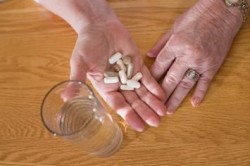 Oxycodone withdrawal includes a wide range of symptoms that are both difficult to cope with an equally difficult to treat. For the user who abruptly stops taking oxycodone or dramatically reduces the amount of medication that is taken after heavy or prolonged Oxycodone use, withdrawal symptoms may even pose potential health threats.
Oxycodone withdrawal includes a wide range of symptoms that are both difficult to cope with an equally difficult to treat. For the user who abruptly stops taking oxycodone or dramatically reduces the amount of medication that is taken after heavy or prolonged Oxycodone use, withdrawal symptoms may even pose potential health threats.
What Causes Oxycodone Withdrawal Symptoms?
The primary cause of Oxycodone withdrawal is the result of having taken Oxycodone for a prolonged period of time, repeatedly or excessively and gained a physical dependence on the drug. As the body builds a tolerance to Oxycodone and physical dependence sets in, there are explicit symptoms of withdrawal which often appear if the user attempts to quit using Oxycodone abruptly or attempts to cut back his or her dose.
Early Oxycodone Withdrawal Symptoms
The early symptoms of Oxycodone withdrawal include various discomforts and may appear similar to the flu or the common cold. These early symptoms may be mild to moderate or severe depending on various factors including the severity of the drug use, the length of time Oxycodone has been used, the level of use, and individual health factors for each user.
The early symptoms of withdrawal usually begin within somewhere between 6 hours and 30 hours of when the user has taken the last dose. They include:
- Agitation
- Anxiety
- Muscle aches
- Muscle pain
- Runny nose
- Sweating
- Yawning
- Tearing
- Insomnia
Late Oxycodone Withdrawal Symptoms
As time progresses on and the user continues to go through the detoxification process, additional Oxycodone withdrawal symptoms may appear. These symptoms include:
- Abdominal cramping
- Nausea
- Vomiting
- Diarrhea
- Goose bumps or chills
- Dilated pupils
- Bone pain
Most of the time, withdrawal symptoms are merely an inconvenience for the user and do not pose any serious health threats. There is a risk of serious side effects in some cases so it is important to seek medical help if you are feeling adverse symptoms of withdrawal as a result of not taking Oxycodone. Talk with your doctor or healthcare provider about the symptoms you are feeling or call our helpline at 888-810-2643 to talk to a counselor who can help.

 Oxycodone Withdrawal Timeline -
The stages of an Oxycodone withdrawal timeline will vary from person to person depending on factors such as, the amount of Oxycodone taken daily and the length of time a person took Oxycodone. About Oxycodone Oxycodone is an effective pain killer that is used to treat people with moderate to severe pain as well as ...
Oxycodone Withdrawal Timeline -
The stages of an Oxycodone withdrawal timeline will vary from person to person depending on factors such as, the amount of Oxycodone taken daily and the length of time a person took Oxycodone. About Oxycodone Oxycodone is an effective pain killer that is used to treat people with moderate to severe pain as well as ...  Oxycodone Withdrawal Duration -
When taken as prescribed, oxycodone can manage pain safely and effectively, but, with repeated use, dependency develops and the person will suffer withdrawal symptoms if they stop or dramatically reduce the medication. The opioid chemical of oxycodone affects the brain and central nervous system with similar effects to heroin. Abnormal use or abuse can cause ...
Oxycodone Withdrawal Duration -
When taken as prescribed, oxycodone can manage pain safely and effectively, but, with repeated use, dependency develops and the person will suffer withdrawal symptoms if they stop or dramatically reduce the medication. The opioid chemical of oxycodone affects the brain and central nervous system with similar effects to heroin. Abnormal use or abuse can cause ...  Is Weaning off Oxycodone A Good Idea? -
Weaning off oxycodone in a professional treatment facility can help prevent relapse and other potential negative consequences.
Is Weaning off Oxycodone A Good Idea? -
Weaning off oxycodone in a professional treatment facility can help prevent relapse and other potential negative consequences.